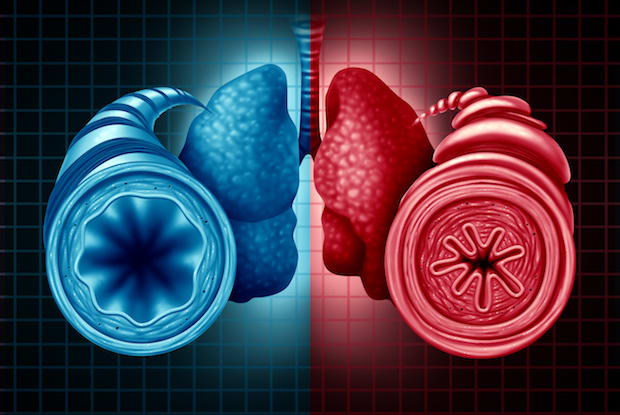Table of Contents
III. Recovering from Pneumonia
Airway Remodeling
Asthma is a chronic lung condition that can affect people throughout their lives. Living with asthma can be challenging, especially when it disrupts sleep and interferes with everyday activities like work, sports, or school. If you have asthma, you may need to actively avoid triggers to reduce the frequency of asthma attacks. Even then, having asthma long-term can permanently remodel the airways in your lungs and narrow your bronchial tubes.
Airway remodeling typically occurs in people who have persistent inflammation in their airways. With the onset of structural changes in the lungs, you may lose lung function, produce more mucus, and develop chronic coughing. Airway remodeling includes changes in cell and tissue structure that cause the airway walls to thicken. [2]

Everyone with asthma is at risk of airway remodeling. Those who leave their asthma symptoms untreated are the most at risk of this complication. But airway remodeling may be preventable to a certain degree. Your lungs may be remodeled less by controlling your asthma symptoms with a treatment plan and anti-inflammatory medications. The fewer asthma symptoms you experience, the less your airways will be remodeled. Some cases have shown that airway remodeling may be reversible. Airways may return to their normal structure if a proper treatment plan is followed.
Respiratory Failure
A severe complication of asthma is respiratory failure. Proper and prompt treatment is necessary to avoid this fatal outcome. Respiratory failure occurs when your blood does not receive enough oxygen, or it has too much carbon dioxide. All the organs in the body require oxygen-rich blood to function, which is why respiratory failure can affect the entire body. A low oxygen level or excessive carbon dioxide in your system may cause symptoms such as:
- Bluish color in the lips, fingernails, and skin
- Confusion
- Shortness of breath
- Drowsiness
- Loss of consciousness
- Arrhythmia (irregular heartbeat)
Chronic respiratory failure can sometimes be treated at home, but acute respiratory failure will require medical assistance right away. Treatments for respiratory failure will aim to increase oxygen levels while removing carbon dioxide from your body. Some of the treatment options available include:
- Oxygen therapy: where a mask or plastic tubes are used to improve oxygen levels.
- Tracheostomy: an incision on the front of the neck and into your windpipe that allows a breathing tube to help you breathe.
- Ventilator: a breathing machine that carries carbon dioxide out while pumping air into your lungs. [1]
Recovering from Pneumonia

Because asthma reduces lung capacity and ability, one common complication is the prolonged time needed to recover from pneumonia. Pneumonia is a lung infection that causes inflammation, along with symptoms such as a rapid heartbeat, chest pain, difficulty breathing, and a fever. {{5}} While asthma does not increase your risk of contracting pneumonia, asthma symptoms may reduce your ability to fight off the infection and open you up to possible aggravations due to a delayed recovery.
If you have asthma, you should take steps to avoid contracting pneumonia. This lung infection is commonly caused by a type of bacteria called Streptococcus pneumoniae. Fungi may also cause pneumonia in people who have a compromised immune system. Smokers have an increased risk of pneumonia because their defense system against bacteria and other invaders is damaged. [3] One way to avoid contracting pneumonia may be to get vaccinations for this infection. Sticking to your asthma treatment plan may also improve your odds of staying pneumonia-free.
Preventing Complications
If you experience asthma symptoms that worry you or show signs that cause concern, talk to your doctor about ways to prevent complications. Avoiding common asthma triggers can help reduce the risk of complications. Make sure you understand the details about the medications you take. Drugs like Singulair, Symbicort, and Ventolin are available to relieve airway discomfort. Your doctor may recommend a peak flow meter to help you recognize an impending asthma attack. Your risk of a complication may be increasing if you notice that you rely on your inhaler more frequently. In this case, you will likely need to see your doctor to adjust your treatment plan. Managing asthma can be a lot of work, but our asthma knowledge base is dedicated to simplifying your asthma treatment. Even with the right treatment, it is important to stick to your treatment plan to avoid long-term complications. Visit an online pharmacy like MediCare Pharmacy to fill your prescription today.
The content in this article is intended for informational purposes only. This website does not provide medical advice. In all circumstances, you should always seek the advice of your physician and/or other qualified health professionals(s) for drug, medical condition, or treatment advice. The content provided on this website is not a substitute for professional medical advice, diagnosis, or treatment.
Reference Resources
- [1] National Library of Medicine pubmed.ncbi.nlm.nih.gov/10608430/
- [2] National Library of Medicine ncbi.nlm.nih.gov/pmc/articles/PMC2933777/
- [3] National Library of Medicine ncbi.nlm.nih.gov/pmc/articles/PMC6489633/






